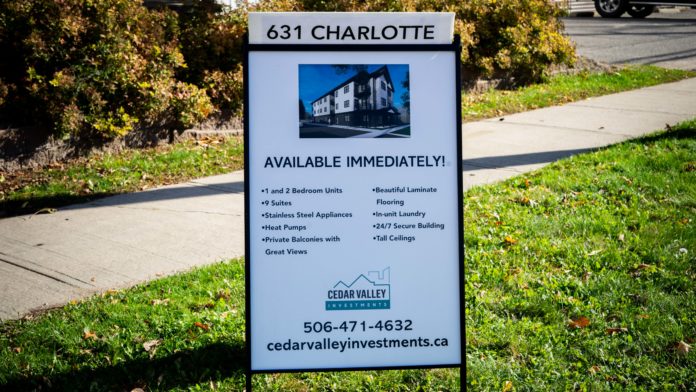
The New Brunswick government announced on Nov. 25 it will not extend the rent cap after Dec. 31, raising questions by advocates on the future of many tenants.
The cap was implemented in March and kept rent increases limited to 3.8 per cent. According to Statistics Canada, New Brunswick’s average rent is $972.25 for a single-bedroom unit.
The Aquinian contacted Jill Green, the minister responsible for housing in New Brunswick, for comment but she did not respond.
Green told a press conference in Fredericton on Nov. 24 that a renewed rent cap was off the table, noting that it was only a “temporary measure.” She added at the time that rent caps have been shown not to have the desired effect.
“If you look at any article by an economist, they say rent caps don’t work,” she told reporters.
“We need development, so we need a laser-focused approach.”
Jael Duarte, a lawyer with New Brunswick’s Coalition for Tenants’ Rights, said in an interview with The Aquinian that tenants now have to deal with potentially being evicted from unaffordable housing on top of the rising cost of living.
“What is worrisome for me is that the government doesn’t care about protecting its population from the recession that is coming,” she said. “Instead, the government is making things even more difficult.”
Duarte said the coalition has advocated for a permanent cap for years so that the system is more predictable for both tenants and landlords.
Without the rent cap, landlords can increase rent in a 12-month period and the increase would be linked to the percentage of the consumer price index (CPI), an indicator of inflation.
Duarte said the rent increases are incompatible with the increases in wages, which will put a lot of people out of their homes.
“I’m already seeing tragedies … people having to live in tragic situations,” she said.
Angus Fletcher, a member of ACORN New Brunswick, said the advocacy group is also complaining about the end of the rent cap.
“We are entering a period of acute housing crisis,” he said.
Fletcher said he is disappointed and angry at the government’s decision, which is why ACORN has organized protests, demanding the two per cent rent cap be made permanent.
David Coon, leader of the Green Party, said affordable housing should be a human right that all people in New Brunswick can access.
He said he expects the government will bring back the rent cap in the prospect of an economic crisis.
“They’ll see people not being able to afford to stay in apartments, not able to find other accommodations and, in some cases, ending up on the street,” said Coon.
He said preventing homelessness should be a priority for the province but said this is not reflected in its actions.
According to the Canadian Observatory on Homelessness, a national research institute devoted to homelessness in Canada, 162 Fredericton residents experienced homelessness in October, compared to 70 in 2018.
With winter right around the corner, Coon raises concerns for homeless people who are currently sleeping out in the open.
“Year after year, it’s like the plan to get people out of the cold is put together at the 11th hour,” he said.
